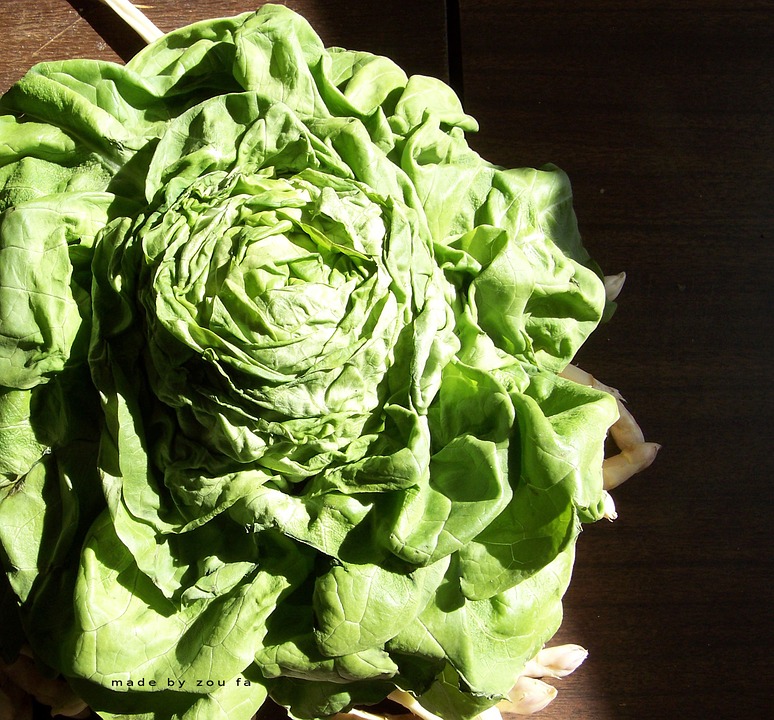This article provides a detailed exploration of feeding lettuce to rabbits, addressing safety concerns, nutritional implications, and practical advice for responsible feeding practices. We'll delve into the nutritional value of lettuce, examine the potential risks, and offer specific guidelines for incorporating this leafy green into your rabbit's diet. Whether you're a seasoned rabbit owner or a new bunny parent, this comprehensive guide will empower you to make informed decisions about your rabbit's well-being.
Part 1: Understanding the Lettuce Dilemma

1.1 The Allure and the Risks
Rabbits, with their innate love for nibbling, often find the crisp texture and refreshing flavour of lettuce irresistible. However, not all lettuce is created equal, and some varieties can pose significant health risks to these delicate creatures.
1.2 Lettuce and Digestive Upset
The high water content and low fibre content of lettuce can wreak havoc on a rabbit's sensitive digestive system. Lettuce's fermentable sugars can contribute to gas build-up, bloating, and diarrhoea, causing discomfort and even more serious health issues.
1.3 Calcium Content and Urinary Issues
Certain lettuce varieties contain high levels of calcium, which can contribute to urinary tract problems in rabbits. High calcium intake can lead to the formation of bladder stones, a painful and potentially life-threatening condition.
Part 2: Deciphering the Nutritional Value

2.1 Lettuce: A Limited Nutritional Source
Lettuce, while appealing to rabbits, offers minimal nutritional value compared to other leafy greens and vegetables. It is primarily composed of water with relatively low amounts of fibre, protein, and vitamins.
2.2 Essential Nutrients in Lettuce
While not a primary source of nutrients, lettuce does contain some vitamins and minerals, including:
- Vitamin K: Essential for blood clotting and bone health.
- Vitamin A: Supports healthy vision and immune function.
- Folic Acid: Important for cell growth and development.
- Potassium: Plays a role in regulating fluid balance and muscle function.
2.3 Nutritional Comparison
When comparing lettuce to other leafy greens, it becomes evident that it falls short in terms of nutritional density. For example, kale, spinach, and collard greens are significantly richer in vitamins, minerals, and fibre, offering a more complete nutritional profile for rabbits.
Part 3: A Guide to Safe Lettuce Choices
3.1 The "Safe List" for Rabbits
While some types of lettuce can be harmful, others are generally considered safe for rabbits in moderation:
- Romaine Lettuce: Romaine is a better choice than iceberg or Boston lettuce because it is lower in calcium and higher in fibre. However, it should still be given in moderation.
- Butter Lettuce: This delicate lettuce is relatively low in calcium and offers a good source of vitamin K. Its mild flavour makes it a palatable option for many rabbits.
- Red Leaf Lettuce: While higher in calcium than romaine, red leaf lettuce can be offered occasionally in small quantities. However, it's crucial to monitor your rabbit for any signs of digestive upset.
3.2 The "Avoid" List
These lettuce varieties are typically considered unsafe for rabbits due to their high calcium content, low nutritional value, or potential for digestive upset:
- Iceberg Lettuce: This popular choice is notoriously low in nutritional value and high in calcium, making it a poor choice for rabbits.
- Boston Lettuce: Similar to iceberg lettuce, Boston lettuce offers minimal nutritional benefit and can contribute to calcium overload.
- Leaf Lettuce: Often referred to as "loose leaf lettuce," this type is generally high in calcium and low in fibre, making it a potential risk for urinary tract issues and digestive problems.
Part 4: Feeding Lettuce Responsibly
4.1 Moderation is Key
Lettuce should never be a staple food for rabbits. It should only be offered as a treat or supplement to a well-balanced diet.
4.2 Gradual Introduction
If you're introducing lettuce to your rabbit's diet, start with a tiny piece and observe their reaction. Monitor for any signs of digestive upset, such as diarrhoea, gas, or bloating. If your rabbit seems to tolerate it well, you can gradually increase the amount offered.
4.3 Choose Organic When Possible
Opt for organic lettuce to minimise the risk of pesticide residues. Pesticide contamination can be harmful to rabbits, so it's essential to prioritise their safety.
4.4 Thorough Washing is Crucial
Always wash lettuce thoroughly to remove any dirt, debris, or pesticide residues. Use cold water and gently pat dry with a clean towel before feeding to your rabbit.
4.5 Remove the Core
Remove the core of the lettuce, as it can be harder to digest and may cause digestive problems. Offer only the outer leaves, which are generally softer and easier for rabbits to process.
4.6 Freshness Matters
Choose fresh, crisp lettuce and discard any wilted or spoiled leaves. Wilted lettuce can harbour bacteria that could make your rabbit sick.
Part 5: The Importance of Hay
5.1 Hay: The Foundation of a Rabbit's Diet
Hay should comprise the majority of a rabbit's diet, providing essential fibre for healthy digestion and preventing dental problems. Hay helps to keep their teeth trimmed and their digestive system functioning properly.
5.2 Recommended Hay Choices
Timothy hay, oat hay, and meadow hay are excellent choices for rabbits, providing a balance of nutrients and fibre. These types of hay offer a more natural and balanced diet than alfalfa hay, which is higher in calcium and can be problematic for adult rabbits.
5.3 Fresh Hay is Essential
Ensure you're providing fresh hay regularly to avoid your rabbit consuming stale or dusty hay. Fresh hay is essential for maintaining a healthy digestive system and preventing the development of health problems.
Part 6: Beyond Lettuce: A Balanced Diet
6.1 A Variety of Veggies is Key
Incorporate a range of other leafy greens and vegetables into your rabbit's diet, offering a variety of nutrients and flavours. This approach promotes a healthy and balanced diet that supports their overall well-being.
6.2 Safe Vegetable Choices
- Kale: Rich in vitamins and minerals, including vitamin C, vitamin K, and calcium. Offer in moderation.
- Spinach: A good source of vitamin K, folate, and iron. Limit spinach intake due to its high oxalic acid content.
- Parsley: A good source of vitamin C and antioxidants. Parsley can be a refreshing treat for rabbits.
- Bell Peppers: Offer a sweet treat and are rich in vitamin C. Green bell peppers are the lowest in calcium.
- Carrots: A good source of vitamin A, but should be given in moderation. Carrots are high in sugar and can contribute to weight gain if given excessively.
- Dandelion Greens: Rich in vitamins, minerals, and fibre. Dandelion greens can be a healthy addition to a rabbit's diet.
- Cilantro: A refreshing treat for rabbits, offering a good source of vitamin C and antioxidants.
6.3 Pellet Considerations
High-quality rabbit pellets should be provided in limited amounts, acting as a supplement to hay and fresh vegetables. Pellets should not constitute the majority of a rabbit's diet.
Part 7: Recognising Signs of Digestive Upset
7.1 Symptoms to Watch For
- Diarrhoea: Loose or watery stools. This can be a sign of digestive upset and may indicate that your rabbit needs a change in diet or a veterinary checkup.
- Bloating: A distended abdomen. Bloating can be caused by gas build-up and can be a sign of digestive issues.
- Loss of Appetite: A decrease in food intake. Rabbits who are not eating well may be experiencing pain or discomfort.
- Lethargy: Reduced energy levels. Lethargy can be a sign of illness or digestive upset.
- Gas: Noises from the digestive tract. Excessive gas can be a sign of bloating or digestive problems.
- Straining to Urinate: Difficulty or pain when urinating can indicate urinary tract issues.
7.2 Seeking Veterinary Advice
If you notice any of these signs, consult your veterinarian promptly. They can help diagnose the issue and recommend the appropriate course of treatment. Early intervention is crucial for ensuring the best possible outcome for your rabbit's health.
Part 8: FAQs
8.1 Can rabbits eat lettuce every day?
No, rabbits should not eat lettuce every day. It should only be given as an occasional treat or supplement. A diet rich in hay and a variety of vegetables is essential for maintaining optimal health.
8.2 What kind of lettuce is safe for rabbits?
Romaine lettuce, butter lettuce, and red leaf lettuce are generally considered safer for rabbits than other varieties. However, even these types should be offered in moderation and with careful monitoring.
8.3 Is it okay to give my rabbit iceberg lettuce?
Iceberg lettuce is not recommended for rabbits due to its high calcium content and low nutritional value. It's best to avoid this type of lettuce entirely.
8.4 How much lettuce can I give my rabbit?
The amount of lettuce you can give your rabbit depends on their size and individual needs. Start with a small piece and observe their reaction. If they tolerate it well, you can gradually increase the amount. However, lettuce should always be a small portion of their overall diet.
8.5 Can rabbits eat lettuce seeds?
Lettuce seeds are not recommended for rabbits as they can be difficult to digest and may pose a choking hazard. It's best to avoid feeding seeds to your rabbit.
8.6 Should I give my rabbit lettuce if they have digestive issues?
No, it's best to avoid lettuce if your rabbit has digestive issues. It's important to consult your veterinarian for advice on managing their digestive health. They can recommend a safe and suitable diet to promote healing and recovery.
8.7 What should I do if my rabbit gets diarrhoea after eating lettuce?
If your rabbit develops diarrhoea after eating lettuce, consult your veterinarian immediately. They can advise you on the best course of action, which may involve dietary changes, medication, or further investigation.
8.8 Is lettuce a good source of vitamins and minerals for rabbits?
Lettuce is not a significant source of vitamins and minerals for rabbits. Hay and a variety of vegetables provide a wider range of essential nutrients. A balanced diet is crucial for maintaining your rabbit's health and well-being.
Everyone is watching
-

Do Rabbits Lay Eggs? (The Surprising Truth)
OTHER TYPES OF PETSThis article will unravel the common misconception that rabbits lay eggs, exploring the fascinating world of r...
-

What's a Group of Rabbits Called? (A Comprehensive Guide)
OTHER TYPES OF PETSThis article delves into the fascinating world of rabbits, exploring the various terms used to describe a grou...
-

Can Rabbits Eat Grapes? A Guide to Safe Rabbit Treats
OTHER TYPES OF PETSThis comprehensive guide will explore the safety and suitability of grapes for rabbits, providing detailed inf...
-

Predators That Hunt Rabbits: A Guide to Natural Enemies
OTHER TYPES OF PETSI've always been fascinated by the circle of life, that delicate dance between predator and prey. Growing up ...
-

Are Rabbits Nocturnal Animals?
OTHER TYPES OF PETSThe question of whether rabbits are nocturnal animals is a fascinating one, with a surprisingly complex answer...
